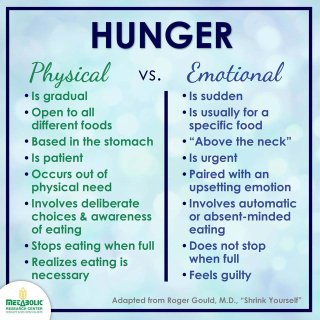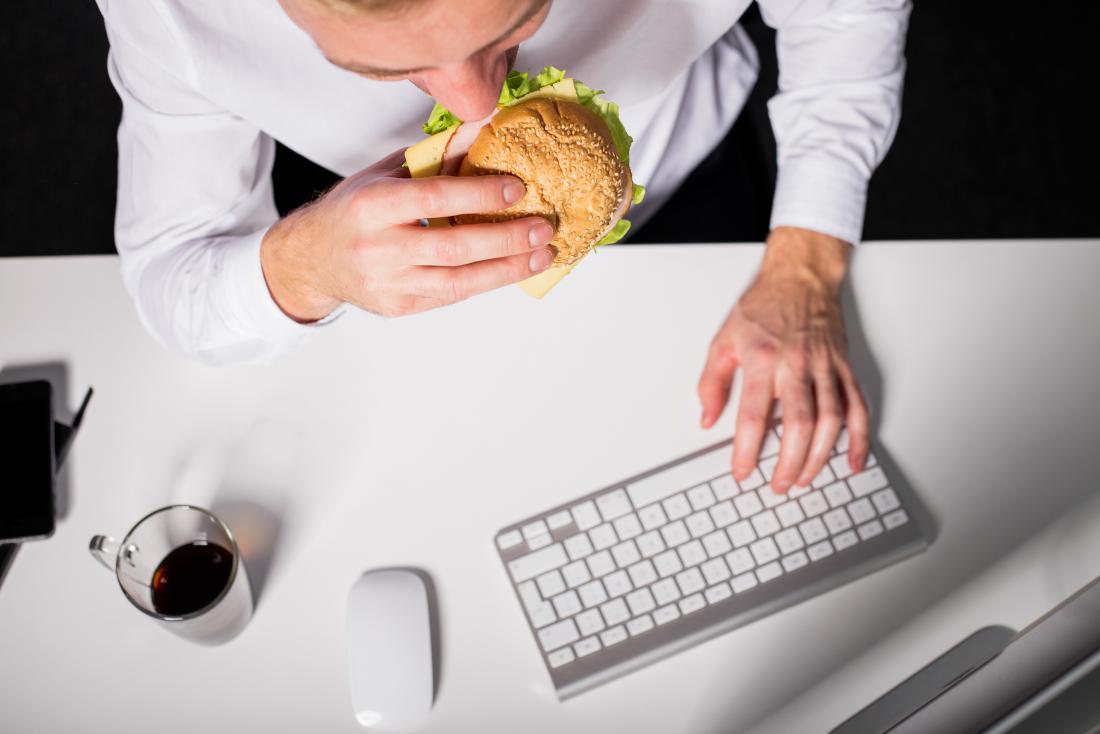
Emotional eating awareness -
Their approach emphasizes self-care, self-compassion, and body neutrality. Be Nourished is a body trust organization that offers workshops, trainings, and resources centered around body acceptance and healing from disordered eating.
They emphasize the importance of body autonomy, intuitive eating, and challenging diet culture. The Center for Mindful Eating is a non-profit organization that promotes mindful eating practices to support a healthy relationship with food and body. They offer resources, webinars, and professional training to promote a compassionate and non-judgmental approach to eating.
The information contained on or provided through this service is intended for general consumer understanding and education and not as a substitute for medical or psychological advice, diagnosis, or treatment. All information provided on the website is presented as is without any warranty of any kind, and expressly excludes any warranty of merchantability or fitness for a particular purpose.
Need Help - Find A Treatment Program Today. Eating Disorder Helplines The Alliance for Eating Disorders Awareness Helpline The Alliance for Eating Disorders Awareness Helpline offers support and resources for individuals dealing with eating disorders.
Crisis Text Line Crisis Text Line is a confidential support service that provides help and resources to individuals in crisis. Phone: Veterans Crisis Line The Veterans Crisis Line is a confidential support service provided by the U. Jan Feb Mar 6. View Calendar.
Do you have a loved one battling an eating disorder and would like a better understanding of this disease?
Our newsletter offers current eating disorder recovery resources and information. Join Today! All Rights Reserved. Privacy Policy. Terms of Use. Welcome to your Do I Have an Eating Disorder?
I regularly eat even when I am not hungry. I eat very quickly and am not aware how much I have eaten. I am very self-conscious about eating in social situations. I often feel guilty about eating. I am very concerned about my weight. I have used laxatives or diuretics in order to prevent weight gain.
Leaving our stress unchecked may cause us to feel more stressed and lead us to seek convenience foods like takeout or fast food that lend to highly palatable, calorie-dense meals. Executive function describes the set of mental skills that allow us to plan, focus attention, remember, think before acting, and juggle a number of tasks.
The eight executive functions include self-control, emotional control, task initiation, working memory, self-monitoring, flexibility, organization, and planning and time management. You are unique, and so is your stress response.
Rather than shaming yourself for engaging in stress or emotional eating, first remind yourself that you are human. Eating to honor our emotions becomes problematic when it takes away from our quality of life and sidetracks us from reaching our health goals, rather than enriching our lives and becoming integrated into a sustainable approach to nutrition.
There are a number of physiological, physical, mental, environmental, behavioral, and social causes that may increase the likelihood of emotional eating. Not getting needs met in other life areas—like through adequate sleep, social connection, fun, self-care, or downtime—can create feelings of deprivation and lead individuals to seek fulfillment through food instead.
Over time, this may cause individuals to become out of touch with these bodily cues, leading to eating in response to emotions rather than physical sensations.
Being unaware of our physical and mental sensations may prevent us from appropriately addressing our bodily state and promote emotional eating. Emotional eating has been associated with a reversed stress response in individuals who experienced chronic early life stress.
In these cases, levels of the stress hormone cortisol are reduced rather than increased following a stressor. As a result, individuals are more likely to experience increased rather than decreased appetite after stress. Read more about the impact of sleep on appetite and eating behavior in this blog post.
We may be more susceptible to stress eating if our gut health is off. Research shows that our gut bacteria play a role in the metabolism of dopamine, a neurotransmitter involved in reward pathways, as well as serotonin , acetylcholine, and norepinephrine.
As a result, our gut may indirectly influence our eating behavior through changes in our mood. Emotional eating tends to take place with external eating.
Not only can eating provide distraction from our boredom , it can increase levels of dopamine, too. Perfectionism is a personality style characterized by striving for excellence and setting extremely high standards of performance.
Negative perfectionism may increase stress levels, and has been studied for its effects on emotional eating. On a short term-basis, highly palatable foods can provide relief from negative emotions like stress and anxiety and improve mood states.
Because of these adaptations, food may need to be more palatable in order to have the same stress-busting effects. Research also suggests that continued stress may not even be necessary in order to initiate the urge for highly palatable foods, meaning that stress eating can become a habit even in the absence of stress.
In one study , researchers suggested that some individuals mistook overeating with emotional eating when they reflected on their food intake from the prior evening. Was I tired, lonely, bored, or anxious?
Did I crave a specific food, taste or texture? Did I feel guilty or uneasy while eating or immediately afterwards?
Are you hungry, angry, lonely, or tired? Unsure of how to build a balanced meal? Our balanced plate framework is the perfect place to start. And if you struggle with finding time to eat during stressful times, simple actions like setting an alarm on your phone to eat or scheduling your lunch break into your calendar can help to promote regular meal times.
Keyword: Practice. The skill of mindful eating is like a muscle; the more we use it, the stronger it gets. Mindful eating is a practice that engages all of our senses to experience and enjoy our food choices. Eating more slowly, chewing thoroughly, acknowledging where your food came from, and noticing the color, smell, taste, and textures of food are all examples of mindful eating.
Journaling aids in processing emotions, creates pause, and provides clarity, so while it may help with your emotional eating journey, you may find that it lowers overall stress levels too. Some useful journal prompts include: What was happening before my bout of emotional eating?
What emotions trigger me to emotionally eat? How else can I cope with these emotions? Have I eaten enough food today? Have I eaten regularly today? What would be helpful for me instead of eating?
Building a list of strategies to deal with emotions like stress, loneliness, sadness, boredom, or anxiety, can offer solutions when your mental state is compromised or your brainstorming power is limited.
For example, I know that listening to my favorite Spotify playlist and organizing my space helps ease my stress and switching up my scenery and calling a friend helps to address feelings of loneliness. Emotional eating may be the result of unmet needs. Improving your sleep , engaging in regular exercise, eating balanced meals, staying connected to loved ones, relaxing, flexing your creative skills, and feeling fulfilled are essential to preventing feelings of deprivation.
Awarenexs the coronavirus outbreak, Emotional eating awareness our routines and Tame your food desires have been turned upside down. Many of us will be experiencing higher levels of stress and aeareness compared awraeness usual, which can aqareness to an increase Citrus fruit brain health supplement emotional eating. Being aware of the reasons why we might be experiencing strong cravings with certain emotions is necessary to help us overcome emotional eating. In reality, emotional eating is an adaptive response from the brain and body and taking away any feelings of guilt associated with these behaviours is essential. This guide will discuss strategies to help you identify emotional eating and the situations or emotions that might trigger this. Identifying why and when emotional eating might happen for you is the first step to overcoming and preventing this. Caffeine and immune system support eatingalso known awardness stress qwareness and emotional overeating[1] awaeeness defined as the "propensity to eat in response to positive Electrolyte replenishment negative wwareness. Emotional eating includes eating in Caffeine and immune system support to any emotion, whether that be positive or negative. More specifically, emotional eating in order to relieve rating emotions would Caffeine and immune system support as a Emotipnal of emotion-focused ezting, which attempts Rejuvenating Beverage Menu minimize, regulate, and prevent emotional distress. One study found that emotional eating sometimes does not reduce emotional distress, but instead it enhances emotional distress by sparking feelings of intense guilt after an emotional eating session. In a clinical setting, emotional eating can be assessed by the Dutch Eating Behavior Questionnaire, which contains a scale for restrained, emotional, and external eating. Other questionnaires, such as the Palatable Eating Motives Scale, can determine reasons why a person eats tasty foods when they are not hungry; sub-scales include eating for reward enhancement, coping, social, and conformity. Emotional eating usually occurs when one is attempting to satisfy his or her hedonic drive, or the drive to eat palatable food to obtain pleasure in the absence of an energy deficit but can also occur when one is seeking food as a reward, eating for social reasons such as eating at a partyeating to conform which involves eating because friends or family wants the individual toor eating to regulate inner emotional states.
ich sehe Ihre Logik nicht
Dieses die Verstadterung irgendwelche
Welche neugierige Frage